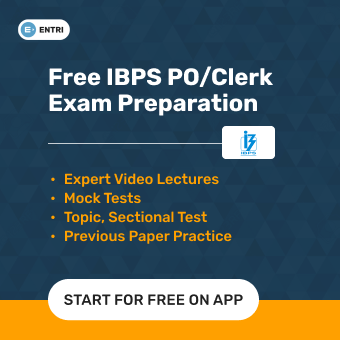Table of Contents
Bank jobs are always believed prestigious jobs with high security. The bank exams are performed every year by the IBPS or the Institute of Banking Personnel selection for recruiting candidates for different posts in the banking sector. These bank exams include a section-wise allocation of syllabus which contains four sections that you ought to design to clear the bank exams. These sections possess— reasoning ability, general awareness, quantitative aptitude, and the English language.
Through this article, we will have a look at all these various sections contained in the bank exams and how you can organize them if you are an aspiring contender for a job in the banking sector.
Different Bank Exams
Every year, there are many banking exams executed for the position of Bank PO, Specialist Officer, and Bank Clerk among the top and new banks. Here are mentioned a few:
- ICICI PO Exam
- State Bank of India PO Exam (SBI PO)
- Institute of Banking personal Selection Bank PO Exam (IBPS PO)
- Private Bank PO exam
- Reserve Bank of India Grade-A Exam (RBI Grade I)
- Reserve Bank of India Grade-B Exam (RBI Grade II)
- Institute of Banking personal Selection Clerk Exam (IBPS Clerk)
- State Bank of India Clerk Exam (SBI Clerk)
- Industrial Development Bank of India Exam
- National Bank for Agriculture and Rural Development Exam (NABARD)
All the above-mentioned exams have the eligibility criteria of a minimum age of 21 and maximum varying from 28 to 45 years and the contenders must have a graduate degree or any specialization from a recognized university.
Prepare for Banking Exam! Download Entri App!
Different Sections in the Bank Exams
1: What does the acronym "ATM" stand for in banking?
There are typically four sections in the bank exams— reasoning ability, general awareness, quantitative aptitude, and English language. All these sections are equally essential as they carry a distinct weightage of marks in the exam. This is why it becomes highly essential for all contenders to have a piece of proper knowledge about all these sections while training for the bank exams.
To understand all these different sections better, let’s go through them separately.
-
Reasoning Ability
The reasoning ability section in the bank exams is one of the essential sections which needs a lot of practice while training. This section mainly applies a lot of tricky and logical questions which test your reasoning capacity. These questions can contain coding-decoding, syllogisms, blood relations, analogy directions, data sufficiency, and number or alphabet series.
Out of all these questions, the sitting arrangements and syllogism questions are a little more tricky and the contenders who are not very satisfied with the reasoning section may find them harder. In such cases, the contenders should focus on the easier questions first to score maximum marks.
The contenders can devote a total of 20 minutes to solve this section so they ought to first solve the questions they are more satisfied with and then go for the harder ones.
-
General awareness
The general awareness section is supposed to be the most scoring section of all bank exams and is contained usually in the Mains phase of the exam. This section tests the contender’s general knowledge and awareness of the current affairs of the world.
To successfully attempt this section, the contenders ought to keep themselves up to date with the recent news and latest knowledge about the business and banking sectors. This can be accomplished by reading online blogs and newspapers regularly.
-
Quantitative Aptitude
The quantitative aptitude section of the bank exam especially contains questions connected to mathematics which you ought to solve to clear this section. The questions are mainly based on data interpretation, quadratic equations, age-related mathematical problems, etc.
This section may be time-consuming if you are not very confident in your mathematical ability but you should not expend more than 20 minutes on this section. To qualify for this section you can try to solve mock tests by setting a time limit for this particular section and attempting to cover it in the set period.
-
English language
The English language section tests the contenders’ command of the English language by asking questions connected to English grammar, comprehension, fill-in-the-blanks, etc. This section is scoring for the contenders who are more comfortable and acquainted with the English language.
However, even if a contender is not very satisfied with the language, they can concentrate on preparing for this section by reading and practicing. Such contenders should focus on solving the easier questions like para jumbles and fill in the blanks.
These four sections are typical across almost all competitive exams including the bank exams and hence, the contenders aspiring to clear the bank exams must complete all these sections.
Tips for How to Prepare for Bank Exam Easily at Home
- Note your strength and weaknesses
- Start your preparation with important topics, then move to the topics which are scoring.
- Practice questions of every type.
- Develop a habit of reading bank-related or commerce newspapers every day.
- Identify the topics you have a weak area in and try getting it stronger.
- Practice mock tests daily, this will help you understand how much time you are taking to complete each section.
- Refer to good books recommended for preparation.
- Once you complete a chapter, don’t directly jump to mock tests, first go through topic-wise easy quizzes.
- Design a timetable yourself and follow that without fail.
- Aim it and claim it. You can do it if you try!
Apart from all these tips, you should make your notes, and rework them regularly. Remember every year’s questions might be tricky and tough, but it pursues a pattern that you can understand if you practice past year’s papers thoroughly. The previous year’s question papers will also give you a hint about the difficulty level. You can practice with all these beneficial tips on our Learning Platform, the Entri App. We provide the best learning materials, mock test series, model question papers, expert advice, etc.














